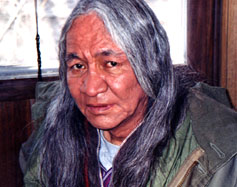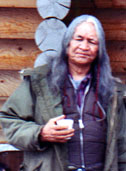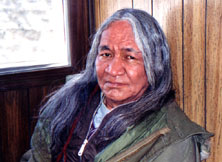
Even though Joe Gomba lives on his own away from town, he's one of the central
characters of Lynx River. He knows the bush, he knows the people...he just plain
knows a lot of things. It's hard to imagine anyone but Jimmy Herman playing Joe
Gomba, so believable has he made the character.
Lorne Cardinal was with us during this interview.
PW: You've been playing Joe Gomba for ten years now. Has the role become second nature to you? Does it come naturally as soon as the cameras start rolling?
JH: It does. After ten years, you know the character. Mind you, I don't go out and act like Joe Gomba. I don't live it at home. But other than that, I know Joe Gomba. He's a very interesting man.

|
PW: Have you known people like him?
JH: Oh yes, I have. In fact, my father was a trapper. So I got to know the routine of how they live, the quiet life.
PW: What were you told about Joe Gomba when you started the show?
JH: It was funny how this came about. When I initially auditioned for this TV series, I auditioned for Leon. When I arrived, Erroll Kinistino got the part, but they decided to keep me and create a character. When they were looking for a last name, I had to laugh because they were thinking of all kinds of last names, and one of them was "Jumbo."
PW: "Joe Jumbo"?
JH: Yeah. I said I didn't want to look like an elephant! But aside from that, I was supposed to be on just for a year. One of the writers told me about it, so I decided to do something to give them my best shot. I think my best shot paid off, because I'm still here.
PW: You decided to make yourself indispensable?
JH: Yeah.
PW: When they created the character for you, did they consult with you about what you wanted the character to be?
JH: No.
PW: But they went away and said, "Let's find a way to use Jimmy in the show."
JH: Right.
PW: And when they said they wanted you to play this trapper out in the bush, that sounded fine to you?
JH: Oh, yeah.
PW: Without giving away too much, would you like to say a little bit about what Joe Gomba is up to in this new movie, "Another Country"?
JH: Oh, I think Joe Gomba plays sort of a snakey part, where I know a lot but I don't let too many people know.
PW: There's something afoot, but you're not telling?
JH: I'm not telling.
PW: I presume that it has something to do with Teevee's problems?
JH: Yeah. Absolutely. I think the show itself is a mystery. When you're watching the film, [the goal] I suppose, would be for everybody to start guessing. And that's the idea. Keep everybody guessing.
PW: How long have you been acting?
JH: Oh, I've been in this business since 1989. To go a little further back, I went though a native communications program, studied television.
PW: Where was that?
JH: In Edmonton. And after graduation, I got a job with Native Counselling Services of Alberta. We'd tell legal stories--not in lawyer's terminology, we'd bring it down and make it into a story. It was for office use, community use, teaching native people about the law. I worked there for seven years. Then I got a little bit part in a CBC TV pilot project called "John Cat," from a W.P. Kinsella book.

|
After having done that, I really liked acting, so I decided I was going to study it. So I did. Finally I quit my job at Native Counselling Services, because I wanted to change careers. Everybody said I was crazy leaving a paying job, but I felt I needed to change. I got word that my name was given to some lady in L.A., and in April of 1989 she came down and auditioned a lot of native men. So I auditioned. The film was "Dances with Wolves."
PW: Ah, yes, I think a few people saw that! [laughs] So that was your first film?
JH: Yeah. That was the beginning. I stayed in South Dakota for six months, and after finishing I came back and started getting bit parts here and there. And that was the beginning.
PW: Do you have anything definite lined up after "Another Country" finishes filming?
JH: I got a little two-day work with a new film coming out called "Dreamkeeper."
PW: Everybody's in that! Where's that going to be filmed?
JH: I think around here in Calgary. That's one of them; there are a lot of other projects coming. In this business, you never know what's coming next.
PW: What do you do in your spare time?
JH: I get into politics now. There's a lot of things happening in our community and a lot of other communities. To give you an idea, we've been approached by the chiefs and they wondered whether we were doing everything diplomatically enough rather than being radical, because when you get radical, it doesn't get anywhere. So we've done a lot of things to play the political game. We're trying to play their game.
PW: You're trying to be more diplomatic.
JH: More diplomatic. We heard a couple of weeks ago about Treaty 8...
PW: Oh, the tax ruling?
JH: Yeah. That kind of stuff's going on. I think we're at a critical situation right now because things are all changing, so we'd like to stay alive and hopefully try to repair something that's been done to our native people for so long. Like history repeating itself. Broken treaties and all that kind of stuff.
PW: The lady I'm staying with is under Treaty 8. What about the two of you?
LC: Treaty 8 as well.
JH: I'm Treaty 6.
PW: That particular ruling on the tax exemption was for people in Treaty 8, right?
JH: Yeah. But the government is appealing it right now.
PW: Yeah, I'm sure they don't want to lose the tax income!
LC: They don't want to owe us, and they owe a lot. My grandfather told me about that a long time ago, about the treaties and what it meant to them when they signed it. It said no taxes.
PW: So all this time, they shouldn't have been collecting taxes from the people covered by those treaties.
JH: Yeah, because you have to remember that tax was introduced for the war effort in the Second World War. It was voluntary and supposed to be temporary. The federal [government] came in and then the provincial [governments] took it up. I guess they fell in love with it.

|
PW: What are the big issues with Treaty 6 today?
JH: A lot of it has got to do with communication among my people. We're not communicating. Gone are the days when people could sit down and visit. Now with this technology we don't see each other. People are becoming further apart from each other.
PW: So the first thing is to get all the Treaty 6 people to sit down and agree so you can present a united front?
JH: I'm Chipewyan, but we're focusing on Dene people first because they have a lot of situations that are happening. And as a result, what we decided was, "Okay, let's focus on one group first, and then go on to Crees, Blackfoots, and try to spread out slow." We do a lot of research, and from that we learn as we go along and improve.
PW: So you do research to gather facts before you approach the government?
JH: Correct. You gotta know the facts. You can't just, "Oh, you broke my treaty." "Okay, where's the fact that says that?" We don't want to assume anything. We've gotta have facts.
When people talk about the conditions of the native people, it's there. What more do you need? The conditions in some communities, it's almost outrageous. You go to Saskatchewan to northern isolated communities and these people are 40-50 years behind. Some of them were taken off their land and put other places.
So we've got a voice for them now. Because when we present something about our problems, we go to provincial courts, we go to federal courts, then we go to the Supreme Court. And it doesn't go anywhere beyond that, unless you can go to a world court.
PW: Do you sometimes get interviewed in newspapers about issues like this because you're well known?
JH: That's one of the reasons I help. They know who I am. So I say, okay, if it's something good, then I'll go for it.
Text and photos (c) 2002 Patricia F. Winter.
All rights reserved. For personal use only. Do not distribute to other persons by electronic or non-electronic means (including posting on a web site) without prior permission from the copyright owner.
Last updated 6/29/09